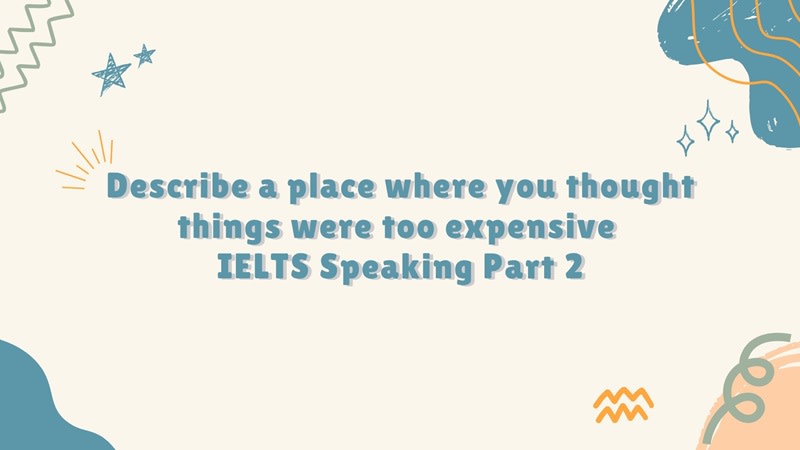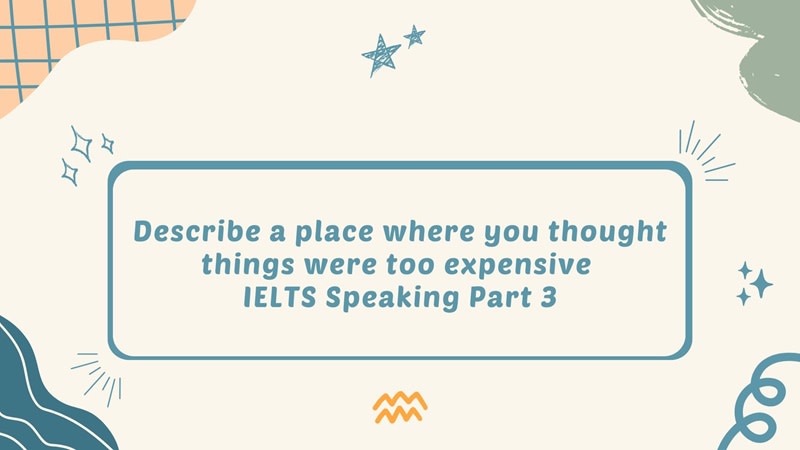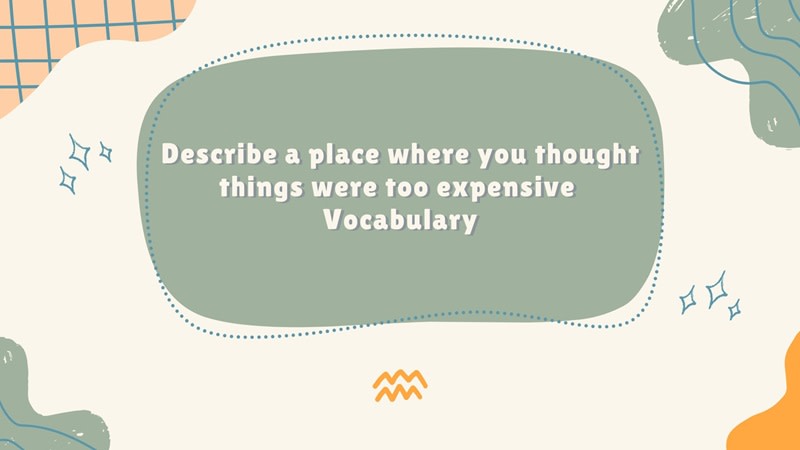Trong phần thi IELTS Speaking, bạn sẽ gặp những chủ đề liên quan đến mô tả một địa điểm, và một trong những đề bài thường gặp là Describe a place where you thought things were too expensive. Đề bài này không chỉ kiểm tra khả năng mô tả của bạn mà còn đòi hỏi bạn phải có vốn từ vựng để kể lại một trải nghiệm thực tế. Cùng IDP tìm hiểu cách triển khai ý tưởng, từ vựng hữu ích và những ý tưởng trả lời giúp bạn tự tin chinh phục chủ đề này trong phòng thi IELTS.
Linh hoạt chọn lịch thi IELTS phù hợp và nhận nhiều ưu đãi cực hấp dẫn tại IDP.
1. Phân tích chủ đề Describe a place where you thought things were too expensive - IELTS Speaking Part 2
Trong phần thi IELTS Speaking Part 2, bạn sẽ được cung cấp một Cue Card (thẻ gợi ý) và có 1 phút để chuẩn bị, sau đó bạn cần trình bày bài nói liên tục trong 1-2 phút. Đối với chủ đề này, cue card thường sẽ có các câu hỏi gợi ý như sau:

Đề bài: Describe a place where you thought things were too expensive
You should say:
Where the place is
When and why you went there
Why you thought things are expensive there
And explain how you felt about the place.
Lưu ý: Hãy chọn một địa điểm mà bạn đã từng có trải nghiệm thực tế hoặc có thể tưởng tượng chi tiết. Đó có thể là một trung tâm thương mại sang trọng, một nhà hàng cao cấp, một khu du lịch nổi tiếng hay một cửa hàng đồ hiệu ..
Với yêu cầu Explain why you thought things were too expensive, đừng chỉ dừng ở việc kể, bạn cần phải đưa ra lý do và lập luận thuyết phục. Bạn có thể đề cập đến:
Giá cả so với chất lượng/giá trị: Liệu sản phẩm/dịch vụ có xứng đáng với số tiền bỏ ra không?
Giá cả so với thu nhập cá nhân: Giá đó có vượt quá khả năng chi trả của bạn không?
Giá cả so với các địa điểm tương tự: So sánh với những nơi khác cung cấp sản phẩm/dịch vụ tương tự.
Chi phí ẩn: Có những chi phí nào khác mà bạn không lường trước không?
Cảm nhận chung: Cảm giác của bạn khi đối mặt với mức giá đó.
2. Dàn ý tham khảo đối với đề Describe a place where you thought things were too expensive - IELTS Speaking Part 2
Để có một bài nói Part 2 mạch lạc và đầy đủ ý, bạn có thể tham khảo dàn ý sau:
Where the place is
| The place I found to be too expensive was a high-end shopping district in Seoul, South Korea, called Gangnam. Gangnam is renowned for its luxurious boutiques, trendy cafes, and upscale entertainment venues. |
When and why you went there | I went there with some friends who were eager to explore the vibrant atmosphere and perhaps indulge in some shopping. |
Why you thought things are expensive there | The reason things are so expensive in Gangnam is primarily due to its reputation as a symbol of wealth and status. The district attracts affluent locals and tourists alike, who are willing to splurge on luxury goods and experiences. The cost of rent for businesses in Gangnam is also exorbitant, contributing to the high prices of products and services |
And explain how you felt about the place.
| I was impressed by the glitz and glamour of the place, and it was fascinating to witness the hustle and bustle of a neighborhood synonymous with wealth and extravagance It was like stepping into a scene from a movie, a world where opulence was the norm and every corner exuded an aura of prestige and sophistication. I couldn't help but feel a bit disheartened by the steep prices. |
3. Bài mẫu topic Describe a place where you thought things were too expensive - IELTS Speaking Part 2
Đề bài: Describe a place where you thought things were too expensive
Bài làm mẫu:
Well, the place I found to be unreasonably expensive was a high-end shopping district in Seoul, South Korea, called Gangnam. Gangnam is synonymous with luxury—renowned for its designer boutiques, trendy cafes, and upscale entertainment venues.
I visited the area with a few friends who were excited to explore its vibrant atmosphere and perhaps treat themselves to a bit of retail therapy.
The reason behind the exorbitant prices in Gangnam lies in its status-driven reputation. It’s widely regarded as a symbol of affluence and social prestige, attracting both wealthy locals and international tourists who are more than willing to splurge on premium experiences. Moreover, the sky-high commercial rents significantly contribute to the inflated costs of goods and services in the district.
Personally, my reaction to Gangnam was a mix of awe and disillusionment. On one hand, I was mesmerized by the glitz and glamour—towering skyscrapers bathed in neon lights, sleek luxury cars cruising by, and impeccably dressed individuals streaming in and out of high-end stores. It genuinely felt like walking through a movie set—an environment where opulence was the norm and every detail radiated exclusivity.
On the other hand, as a university student on a modest budget, I couldn't help but feel a sense of alienation. The staggering price tags made even simple purchases feel out of reach, which led me to reflect on the socio-economic divide in South Korean society. It also made me question how much value we place on material wealth and consumerism.
Overall, while I admired the sophistication and polish of Gangnam, it ultimately felt somewhat inaccessible to ordinary people like myself. It was both fascinating and eye-opening—a place that dazzles on the surface, but also provokes deeper reflection about class, status, and spending culture.
Vocabulary ghi điểm:
unreasonably expensive (adj phr.): đắt một cách vô lý
high-end shopping district (noun phr.): khu mua sắm cao cấp
synonymous with luxury (adj phr.): đồng nghĩa với sự xa xỉ
upscale entertainment venues (noun phr.): địa điểm giải trí sang trọng
treat themselves to a bit of retail therapy (idiom): mua sắm để giải tỏa tâm trạng
status-driven reputation (noun phr.): danh tiếng gắn liền với địa vị xã hội
symbol of affluence and social prestige (noun phr.): biểu tượng của giàu có và địa vị
splurge on premium experiences (verb phr.): chi tiêu mạnh tay cho những trải nghiệm cao cấp
sky-high commercial rents (adj phr.): giá thuê mặt bằng thương mại cao ngất ngưởng
inflated costs (noun phr.): chi phí bị đội lên
awe and disillusionment (noun phr.): sự ngưỡng mộ pha chút vỡ mộng
glitz and glamour (noun phr.): sự hào nhoáng và sang trọng
opulence was the norm (phrase): sự xa hoa là điều bình thường
exclusivity (n): tính độc quyền, xa xỉ
alienation (n): cảm giác xa cách, không thuộc về
staggering price tags (noun phr.): mức giá cao đến choáng váng
socio-economic divide (noun phr.): sự phân hóa kinh tế xã hội
material wealth and consumerism (noun phr.): của cải vật chất và chủ nghĩa tiêu dùng
sophistication and polish (noun phr.): sự tinh tế và chỉn chu
somewhat inaccessible to ordinary people (adj phr.): phần nào đó không phù hợp với người bình thường
4. Bài mẫu topic Describe a place where you thought things were too expensive - Part 3
Câu hỏi: Why are things more expensive in some places than in others?
Prices can fluctuate significantly from one location to another due to a variety of interconnected factors, such as the cost of living, local economic conditions, taxation policies, and supply-and-demand dynamics. For instance, in remote or rural areas, products often come with a higher price tag due to elevated transportation and logistical expenses. Conversely, in urban centers, while goods might be more readily available, higher operational costs - including rent and labor - can drive up prices for both goods and services.
Furthermore, regional tax structures also play a critical role. Areas with higher value-added taxes (VAT) or import duties often see those costs passed on to consumers, directly affecting the final retail price.
Vocabulary ghi điểm:
fluctuate significantly (verb phr.): biến động mạnh
interconnected factors (noun phr.): các yếu tố có mối liên hệ với nhau
cost of living (noun phr.): chi phí sinh hoạt
local economic conditions (noun phr.): điều kiện kinh tế địa phương
taxation policies (noun phr.): chính sách thuế
supply-and-demand dynamics (noun phr.): biến động cung cầu
elevated transportation and logistics expenses (noun phr.): chi phí vận chuyển và hậu cần cao hơn
higher operational costs (noun phr.): chi phí vận hành cao hơn
drive up prices (verb phr.): đẩy giá lên
regional tax structures (noun phr.): cấu trúc thuế khu vực
value-added taxes (VAT) (noun phr.): thuế giá trị gia tăng
passed on to consumers (verb phr.): được chuyển vào giá bán cho người tiêu dùng

Câu hỏi: Do you think expensive products are always better than cheaper ones?
Not necessarily. While it's true that expensive products often reflect superior quality, materials, or craftsmanship, this isn't always the case. In many situations, consumers are simply paying a premium for branding or marketing hype.
Take generic medications, for example - they’re often chemically identical to their branded counterparts but sold at a fraction of the price. Similarly, in the fashion industry, a basic t-shirt from a luxury designer label might cost a small fortune, yet its actual quality may not differ significantly from a much more affordable alternative.
That’s why I believe it’s essential to assess value for money, rather than automatically associating a higher price tag with superior quality.
Vocabulary ghi điểm:
quality, materials, or craftsmanship (noun phr.): chất lượng, nguyên vật liệu, tay nghề
premium for branding or marketing hype (noun phr.): số tiền phải trả thêm cho thương hiệu hoặc sự thổi phồng tiếp thị
generic medications (noun phr.): thuốc gốc (không có thương hiệu)
chemically identical (adj phr.): giống hệt về thành phần hóa học
luxury designer label (noun phr.): nhãn hiệu thời trang cao cấp
actual quality (noun phr.): chất lượng thực tế
affordable alternative (noun phr.): lựa chọn thay thế giá rẻ
value for money (noun phr.): giá trị so với chi phí bỏ ra
automatically associating (verb phr.): mặc định gắn liền, liên tưởng một cách tự động
Câu hỏi: Why do some people like to buy expensive things?
Well, there are several reasons why people might choose to purchase high-priced items. Firstly, for some individuals, it's about status and prestige. Owning luxury goods can serve as a way to signal wealth and social standing, especially in societies where material possessions are closely linked to identity and success.
Secondly, there's often a perceived correlation between price and quality. Many people believe that expensive products offer superior craftsmanship, greater durability, and higher performance standards, making them a more worthwhile long-term investment.
Thirdly, the brand experience itself plays a major role. High-end brands tend to offer personalized customer service, a sense of exclusivity, and an overall feeling of indulgence, which can be very appealing to consumers seeking more than just a product—they're buying a lifestyle.
Lastly, in certain cases—such as artwork, designer handbags, or limited-edition collectibles - people view these purchases as financial investments, hoping that their value will appreciate over time.
Vocabulary ghi điểm:
high-priced items (noun phr.): các món đồ đắt tiền
status and prestige (noun phr.): địa vị và sự uy tín
signal wealth and social standing (verb phr.): thể hiện sự giàu có và vị thế xã hội
perceived correlation between price and quality (noun phr.): mối liên hệ được cho là tồn tại giữa giá và chất lượng
superior craftsmanship (noun phr.): tay nghề cao cấp
greater durability (noun phr.): độ bền cao hơn
higher performance standards (noun phr.): tiêu chuẩn hoạt động cao hơn
brand experience (noun phr.): trải nghiệm thương hiệu
personalized customer service (noun phr.): dịch vụ chăm sóc khách hàng được cá nhân hóa
exclusivity (n): tính độc quyền, đặc biệt
financial investments (noun phr.): khoản đầu tư tài chính
appreciate over time (verb phr.): tăng giá trị theo thời gian
5. Từ vựng chủ đề Describe a place where you thought things were too expensive
Từ vựng chung phổ biến
Từ/ cụm từ vựng | Ý nghĩa | Ví dụ |
|---|---|---|
overpriced | bị tính giá quá cao | The souvenirs at the shop were completely overpriced. |
exorbitant | giá cắt cổ, cao quá mức | They charged an exorbitant amount for a simple meal. |
costly | đắt đỏ | It was a costly dinner, but the food wasn’t that impressive. |
pricey | hơi đắt (informal) | The clothes in that boutique are too pricey for students. |
outrageous price | giá trên trời, phi lý | I had to pay an outrageous price for bottled water at the theme park. |
rip-off | thứ bị chặt chém, không đáng tiền | That hotel room was a real rip-off considering the poor service. |
inflated prices | giá bị thổi phồng | During the holiday season, many stores set inflated prices. |
tourist trap | nơi chặt chém khách du lịch | The restaurant near the beach was a typical tourist trap. |

Các collocation về chủ đề Describe a place where you thought things were too expensive
Collocation | Ý nghĩa |
|---|---|
to be charged a premium | bị tính giá cao hơn bình thường |
not worth the price tag | không xứng đáng với giá tiền |
to be wallet-friendly | giá cả phải chăng, thân thiện với túi tiền |
poor value for money | không đáng tiền |
Các Idiom về chủ đề Describe a place where you thought things were too expensive
Idiom | Ý nghĩa |
|---|---|
cost an arm and a leg | cực kỳ đắt |
pay through the nose | trả giá đắt bất thường |
daylight robbery | ăn cướp giữa ban ngày (ẩn dụ giá quá cao) |
highway robbery | giá quá cao, bất công |
break the bank | làm bạn tốn rất nhiều tiền |
burn a hole in your pocket | tiêu tốn nhiều tiền nhanh chóng |
prices were through the roof | giá cả rất cao |
have deep pockets | có nhiều tiền, giàu có |
Tự tin ghi điểm cao trong bài thi IELTS Speaking cùng IDP
Chủ đề Describe a place where you thought things were too expensive là cơ hội để bạn vừa kể lại trải nghiệm thực tế, vừa thể hiện khả năng phân tích, so sánh và bày tỏ cảm xúc cá nhân. Bằng cách sử dụng từ vựng đa dạng về giá cả và cảm xúc, kết hợp với idioms tự nhiên, bạn có thể khiến phần trả lời Speaking trở nên sinh động và thuyết phục hơn. Quan trọng nhất, hãy nhớ rằng giám khảo không đánh giá câu chuyện của bạn như thế nào, mà đánh giá cách bạn triển khai ý tưởng, dùng từ linh hoạt và nói mạch lạc.
Nếu bạn đang lên kế hoạch thi IELTS tại IDP, bạn có thể lựa chọn bài thi IELTS trên máy tính với lịch thi IELTS được tổ chức linh hoạt hàng tuần. Đặc biệt, nếu bạn vẫn chưa đạt được điểm số mong muốn trong lần thi đầu tiên, bạn có thể lựa chọn thi IELTS One Skill Retake - cho phép bạn thi lại một kỹ năng duy nhất mà không cần phải làm lại toàn bộ bài thi.
Và khi bạn đã sẵn sàng, hãy đăng ký thi IELTS với IDP ngay
